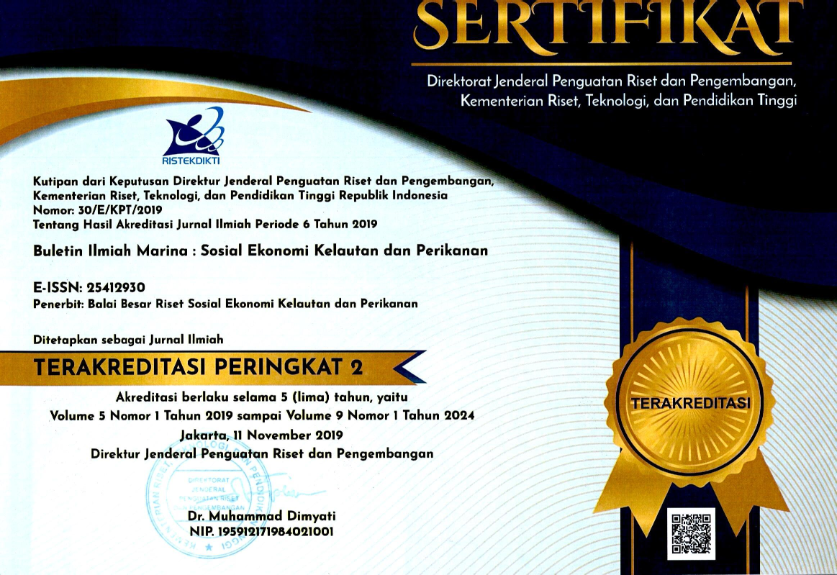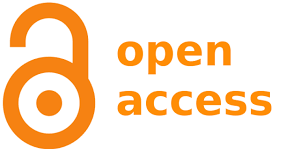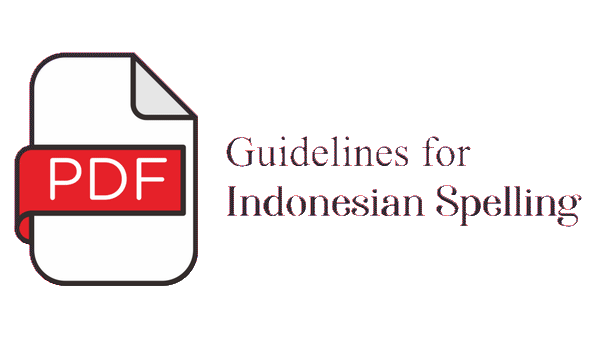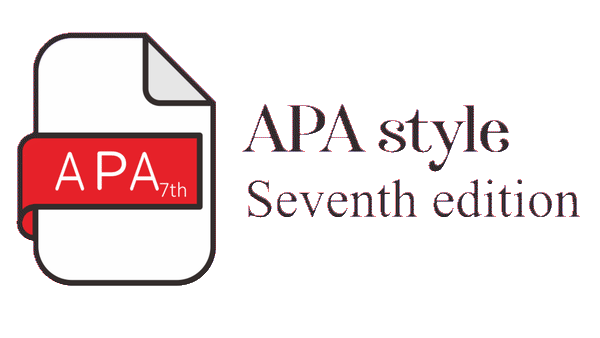Strategi Penghidupan Masyarakat Pesisir di Giligenting Kabupaten Sumenep, Jawa Timur
Abstract
Penelitian ini bertujuan untuk mengidentifikasi potensi lokal dan permasalahan ekonomi masyarakat pesisir Pulau Giligenting, Kabupaten Sumenep, serta menganalisis strategi penghidupan masyarakat pesisir yang dilakukan dalam menyelesaikan permasalahan ekonominya. Penelitian ini dilakukan pada bulan April—September tahun 2019. Metode penelitian yang digunakan dalam penelitian ini adalah deskriptif kualitatif dengan metode pengumpulan data melalui wawancara, observasi, dan studi literatur. Jenis informan dalam penelitian ini adalah perangkat desa, tokoh pemuda, dan
masyarakat yang berprofesi sebagai nelayan dan petani, sedangkan data sekunder terdiri dari dokumen, seperti buku, jurnal, sumber dari arsip, dan dokumen resmi. Hasil penelitian menunjukkan bahwa problematika masyarakat Pulau Giligenting adalah minimnya penduduk yang berusia produktif, kurangnya air untuk pertanian, hingga keberadaan perusahaan migas yang mengganggu mata pencaharian karena mencemari ekosistem laut sekitar. Namun untuk bertahan dari permasalahan tersebut,
mereka tidak melakukan diversifikasi mata pencaharian, akan tetapi justru mengambil langkah untuk migrasi. Masyarakat Pulau Giligenting secara sosio-historis memang telah memiliki kebiasaan
bermigrasi ketika dihadapkan dengan masalah ekonomi. Hingga kini, kebiasaan tersebut masih dipercaya sebagai jalan keluar dari masalah ekonomi, walaupun daerah mereka saat ini
mempunyai potensi pariwisata yang menjanjikan bagi keberlangsungan hidup masyarakat Pulau Giligenting.
Title: Livelihood Strategy of Giligenting Coastal Community in Sumenep Regency, East Java Province
This study aims to identify the potency of natural resources and the problems which were economically encountered by Giligenting coastal community, and to analyze the livelihood strategies used to overcome their problems. The study was conducted in April until September 2019 with descriptive qualitative method. Data were collected through interview with selected informan, observation, and secondary data source. The informan of this study were village officials, youth leaders, fishers, and farmers, while secondary data were obtained from books, journals, sources from archives, and official documents. The result showed that Giligenting coastal community has been dealing with seasonal drought, contamination
of mining activities and lack of human resources. Respond to their problems, Giligenting coastal
community take strategies not only livelihood diversification but also migration to Jakarta City.
The communities of Giligenting Island have a socio-historical habit to migrate as a believe to resolve their economic problems despite of the potential tourism area of Giligenting Island for the survival of its communities.
Keywords
Full Text:
PDFReferences
Ahlburg, D. A. (1991). Remittances and their impact: A study of Tinga and Western Samoa. National Centre for Development Studies.
Ambari, M. (2018). Negara tidak hadir di tengah masyarakat pesisir? Mongabay. https://www.mongabay.co.id/2018/04/20/negara-tidak-hadir-di-tengah-masyarakat-pesisir/
Aparicio, J., Tenza-Abril, A. J., Borg, M., Galea, J., & Candela, L. (2019). Agricultural irrigation of vine crops from desalinated and brackish groundwater under an economic perspective: A case study in Siġġiewi, Malta. Science of the Total Environment, 650, 734–740. https://doi.org/10.1016/j.scitotenv.2018.09.059
Attard, G., & Azzopardi, E. (2005). An overview of irrigation system performance on the island of Malta. Options Méditerranéennes. Série B: Etudes et Recherches (CIHEAM), 165–172.
Branda-Shute, R., & G. Brana-Shute. (1982). The magnitude and impact of remittances in the Eastern Caribbean: a research note (W. F. Stin). Research Institute on Immigration and Ethnic Studies, The Smithsonian Institute.
Carloni, A., & Crowley, E. (2005). Rapid guide for missions: Analysing local institutions and livelihoods. Food and Agriculture Organization of the United Nations.
Chambers, R. (1995). Poverty and livelihoods: whose reality counts? ID discussion paper. IDS.
Connell, J., & Conway, D. (2000). Migration and remittances in Island Microstates: A comparative perspective on the South Pacific and the Caribbean. International Journal of Urban and Regional Research, 24(1), 52–78. https://doi.org/https://doi.org/10.1111/1468-2427.00235
Dangi, T. B., & Jamal, T. (2016). An integrated approach to “sustainable community-based tourism.” Sustainability (Switzerland), 8(5). https://doi.org/10.3390/su8050475
Fang, Y. P., Fan, J., Shen, M. Y., & Song, M. Q. (2014). Sensitivity of livelihood strategy to livelihood capital in mountain areas: Empirical analysis based on different settlements in the upper reaches of the Minjiang River, China. Ecological Indicators, 38, 225–235. https://doi.org/10.1016/j.ecolind.2013.11.007
Ferragina, E., & Arrigoni, A. (2017). The Rise and fall of social capital: Requiem for a theory? Political Studies Review, 15(3), 355–367. https://doi.org/10.1177/1478929915623968
Fukuyama, F. (1995). Trust: The social virtues and the creation of prosperity. The Free Press.
Fukuyama, F. (2001). Social capital, civil society and development. Third World Quarterly, 22(1), 7–20. https://doi.org/10.1080/713701144
Giesbrecht, D. J. (2011). Small-scale fisher livelihood strategies and the role of credit in Paraty Brazil. University of Manitoba.
Huda, M., & Yunas, N. S. (2017). Good extractive governance sebuah gagasan untuk kesejahteraan masyarakat wilayah pertambangan di Indonesia. Jurnal Matra Pembaruan, 1(2), 75–84. https://doi.org/10.21787/mp.3.2.2019.99-108
Islam, F. S., Pratomo, D. G., & Khomsin, K. (2019). Identification of coral reef conditions using hydro-acoustic technology in Giligenting Island, Sumenep Regency Indonesia. IPTEK Journal of Proceedings Series, 2, 40. https://doi.org/10.12962/j23546026.y2019i2.5303
Jackman, R. W., & Miller, R. A. (1998). Social Capital and Politics. Annual Review of Political Science, 1(1), 47–73. https://doi.org/10.1146/annurev.polisci.1.1.47
Maloeng, L. J. (2018). Metodologi Pendekatan Kualitatif. PT Remaja Rosdakarya.
Mandle, J. (1996). Persistent underdevelopment, change and economic modernization in the West Indies. Gordon and Breach.
Marshal, D. I. (1984). Migration and development in the eastern Caribbean (R. A. Pasto (ed.); Migration). Westview Press.
Mbaiwa, J. E. (2011). Changes on traditional livelihood activities and lifestyles caused by tourism development in the Okavango Delta, Botswana. Tourism Management, 32(5), 1050–1060. https://doi.org/10.1016/j.tourman.2010.09.002
Papadimitriou, L., D’Agostino, D., Borg, M., Hallett, S., Sakrabani, R., Thompson, A., & Knox, J. (2019). Developing a water strategy for sustainable irrigated agriculture in Mediterranean island communities – Insights from Malta. Outlook on Agriculture, 48(2), 143–151. https://doi.org/10.1177/0030727019841060
Purba, D. (2016). Rancangan model CSR (Pertiwi) sebagai basis pengembangan kearifan lokal masyarakat Pulau Giligenting. National Conference On Economic Education, 315–350.
Putri, M. R., Setiawan, A., Pohlmann, T., Mayer, B., & Gade, M. (2016). The assessment of oil pollution in Seribu Islands based on remote sensing and numerical models. European Space Agency, (Special Publication) ESA SP, SP-740(May).
Robert, L., Cremona, M., & Knox, G. (2015). Why Malta’s national water plan requires an analytical policy framework. The Today Public Policy Institut.
Rubenstein, H. (1983). Remittances and rural underdevelopment in the English-Speaking Caribbean. Human Organization, 42(4), 295–306. https://doi.org/10.17730/humo.42.4.0709108414538471
Salafsky, N., & Wollenberg, E. (2000). Linking livelihoods and conservation: A conceptual framework and scale for assessing the integration of human needs and biodiversity. World Development, 28(8), 1421–1438. https://doi.org/10.1016/S0305-750X(00)00031-0
Satria, A. (2015). Pengantar Sosiologi Masyarakat Pesisir. Obor.
Scoones, I. (1998). Sustainable rural livelihoods a framework for analysis. In IDS Working Paper (Vol. 72, Issue 2). https://doi.org/10.1057/palgrave.development.1110037
Scoones, I. (2009). Livelihoods perspectives and rural development. Journal of Peasant Studies, 36(1), 171–196. https://doi.org/10.1080/03066150902820503
Susanto, V. Y. (2019, September 12). Hingga Agustus 2019, KKP salurkan asuransi nelayan sebanyak Rp 388 miliar. Kontan.Co.Id. https://nasional.kontan.co.id/news/hingga-agustus-2019-kkp-salurkan-asuransi-nelayan-sebanyak-rp-388-miliar
Syamsuddin, M. (2019). History of Madura : Sejarah, Budaya dan Ajaran Luhur Masyarakat Madura. Araska.
Tittonell, P., Muriuki, A., Shepherd, K. D., Mugendi, D., Kaizzi, K. C., Okeyo, J., Verchot, L., Coe, R., & Vanlauwe, B. (2010). The diversity of rural livelihoods and their influence on soil fertility in agricultural systems of East Africa - A typology of smallholder farms. Agricultural Systems, 103(2), 83–97. https://doi.org/10.1016/j.agsy.2009.10.001
van den Berg, M. (2010). Household income strategies and natural disasters: Dynamic livelihoods in rural Nicaragua. Ecological Economics, 69(3), 592–602. https://doi.org/10.1016/j.ecolecon.2009.09.006
van Holt, T. (2012). Landscape influences on fisher success: Adaptation strategies in closed and open access fisheries in southern Chile. Ecology and Society, 17(1). https://doi.org/10.5751/ES-04608-170128
Viola, F., Sapiano, M., Schembri, M., Brincat, C., Lopez, A., Toscano, A., Diamadopoulos, E., Charalambous, B., Molle, B., Zoumadakis, M., Armengol, A. T., Vich, M. G., & Noto, M. T. (2014). The state of water resources in major Mediterranean islands. Water Resources, 41(6), 639–648. https://doi.org/10.1134/S0097807814060207
Wright, J. H., Hill, N. A. O., Roe, D., Rowcliffe, J. M., Kümpel, N. F., Day, M., Booker, F., & Milner-Gulland, E. J. (2016). Reframing the concept of alternative livelihoods. Conservation Biology, 30(1), 7–13. https://doi.org/10.1111/cobi.12607
Zamzami, L. (2011). Pemberdayaan ekonomi masyarakat pesisir di Nagari Ampiang Perak, Sumatera Barat. MIMBAR, XXVII(1), 113–125. https://doi.org/https://doi.org/10.29313/mimbar.v27i1.318
Zenteno, M., Zuidema, P. A., de Jong, W., & Boot, R. G. A. (2013). Livelihood strategies and forest dependence: New insights from Bolivian forest communities. Forest Policy and Economics, 26, 12–21. https://doi.org/10.1016/j.forpol.2012.09.011
DOI: http://dx.doi.org/10.15578/marina.v7i1.8656
Refbacks
- There are currently no refbacks.
Indexed by:
---------------------------------------------------------------------------------------
Published by
Balai Besar Riset Sosial Ekonomi Kelautan dan Perikanan
in collaboration with
Indonesian Marine and Fisheries Socio-Economics Research Network

This work is licensed under a Creative Commons Attribution-NonCommercial-ShareAlike 4.0 International License.


























